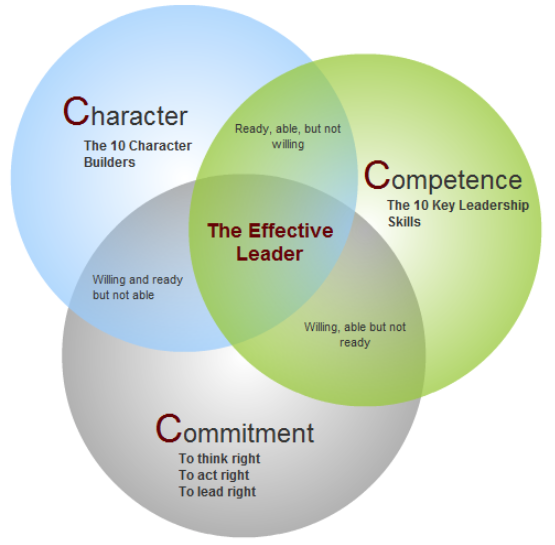Dr. Jim Laub is available to provide customized, experiential and application oriented leadership development training for your current executive and/or emerging leaders. To give you a sense of what is possible, review the Executive (or Emerging) Leadership Program detailed below. All training integrate the concepts of servant-minded leadership and uses the highest level of active learning in all training sessions.
Executive or Emerging Leadership program
This special one-year program can be designed for executive leaders or emerging leaders and is designed to be delivered over a one-year period. The schedule, however, can be customized to fit your organization and your schedule. The curriculum is presented within the three C’s of effective leadership; Leadership Competence, Character and Commitment.
10 Key Leadership Skill Areas
As a Leader, you must know how to …
I. Take the lead
- Making the decision to lead
- Understanding the key skills of leadership (Vision/Action/Mobilization/Change)
- Understanding the key skills of management (Plan/Organize/Supervise/Monitor)
- What leadership means at the Waterford (mission, vision, values)
II. Become a leader
- Personal leadership development
- Understanding your unique gifts and capacities (assessment)
- Awareness of personal weaknesses and pitfalls
- Build an individual Learning Plan (ILP)
III. Assess the situation
- Developing observation and interviewing skills
- Conducting a needs assessment
- Developing analysis skills – interpreting the information
- Utilizing a positive, assets-based approach to assessment
IV. Envision improvement
- Developing a vision
- Communicating your vision
- Creating a shared vision with your team
- Aligning your team to the vision
V. Plan your strategy
- Establishing priorities
- Setting strategic milestones and goals
- Managing your time effectively
- Organize the work (tasks and people)
VI. Implement your plan
- Building a bias for action, for yourself and your team
- Managing your progress
- Running effective meetings
- Celebrating achievements
VII. Mobilize your team
- Building strong relationships
- Identifying each person’s unique contribution (giftedness)
- Building trust & communicating effectively
- Handling conflict within the team
VIII. Achieve key results (individual and team)
- Empowering/motivating others through transformational leadership
- Creating effective job descriptions (negotiating results and support)
- Holding people accountable for performance (reports/performance reviews)
- Utilizing coaching skills to enhance team and individual performance
IX. Partner with others
- Working effectively across departments
- Working with other leaders
- Partnering with vs. Leading over
- Linking to the bigger picture – moving the whole organization forward
X. Celebrate your success
- Affirming and encouraging individuals and the team
- Understanding incentive and rewards
- Taking time to reflect, and learn from, our success
- Programming celebration
Possible one year Program Schedule: (can be customized)
|
Month |
Workshops |
Key Training Topics |
Experiences & Relationships |
|
|
1 |
Two Hour |
Introduction to the program |
Commitment to the program |
|
|
2 |
One Day |
I. Take the lead II. Become a leader |
Set up mentoring relationships |
|
|
3 |
Two Hour |
III. Assess the situation |
Conduct a needs assessment |
|
|
4 |
Two Hour |
IV. Envision improvement |
Write a vision for improvement |
|
|
5 |
One Day |
V. Plan your strategy |
Develop a strategy |
|
|
6 |
Two Hour |
VI. Implement your plan |
Develop a proposal |
|
|
7 |
Two Hour |
VII. Mobilize your team (1) |
Finalize the proposal |
|
|
8 |
One Day |
VII. Mobilize your team (2) |
Present the proposal |
|
|
9 |
Two Hour |
VIII. Achieve key results |
Refine the proposal |
|
|
10 |
Two Hour |
IX. Partner with others |
Begin implementation |
|
|
11 |
One Day |
X. Celebrate your success All key areas of leading |
Continue implementation |
|
|
12 |
Two Hour |
Closing Celebration |
Sharing with mentors |
Benefits of this type of program – In contrast to “off-the-shelf” training programs
This Program is:
- customizable – to your organization
- adaptable – can be adjusted as needed
- experiential – related to real life/work problem and issues
- values-based – related to servant leadership concepts that lead to healthy organizations
- results-oriented – focused on outcomes
- conducted through live training workshops
